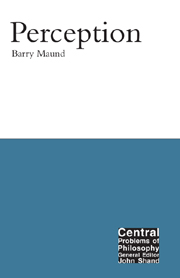Book contents
- Frontmatter
- Contents
- Preface
- 1 The philosophy of perception
- 2 A theory of natural realism
- 3 Theories of perceptual experiences
- 4 Representationalism: representations as natural signs
- 5 Natural realism: Putnam, Austin and Heidegger
- 6 Perception: the argument from illusion
- 7 The phenomenal and phenomenological senses of “looks”
- 8 Types of perceptual content
- 9 The representationalist–intentionalist thesis
- 10 Adverbialist accounts of perceptual experience
- Conclusion
- Notes
- References
- Index
Conclusion
- Frontmatter
- Contents
- Preface
- 1 The philosophy of perception
- 2 A theory of natural realism
- 3 Theories of perceptual experiences
- 4 Representationalism: representations as natural signs
- 5 Natural realism: Putnam, Austin and Heidegger
- 6 Perception: the argument from illusion
- 7 The phenomenal and phenomenological senses of “looks”
- 8 Types of perceptual content
- 9 The representationalist–intentionalist thesis
- 10 Adverbialist accounts of perceptual experience
- Conclusion
- Notes
- References
- Index
Summary
There are two major interrelated problems in the philosophy of perception: whether perception is direct or indirect; and what is the best account that we can give of perceptual experiences. I have aimed in this book to provide a framework, a “natural realist” view of perception, that would provide the means for making progress towards solving these problems, and for examining the major theories that have been provided. My aim has principally been to set out these issues, although I have not disguised the fact that I think that there are solid grounds that point the way to a particular resolution of the problems.
I argued initially that the debate between direct and indirect realism should be moved from a debate about perception to one about perceptual experience. I provided and defended a theory that is a form of indirect representationalism, a “hybrid theory”, which had indirect and direct components. Perceptual experiences, on this account, are complex thoughts that have non-conceptual, sensuous components and other components that are conceptual and non-sensuous. A conscious perceptual experience is an intentional activity. It is an act of (double) awareness, an activity, that consists of the perceiver taking the sensuous component to be a sign of the presence of something of a certain kind, for example, that there is a certain kind of physical object before him or her.
One path to handling the problem of direct–indirect perceptual experience is through the argument from illusion.
- Type
- Chapter
- Information
- Perception , pp. 209 - 210Publisher: Acumen PublishingPrint publication year: 2002

